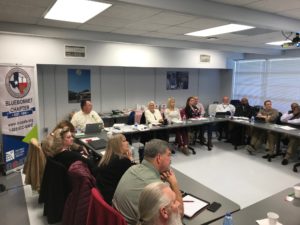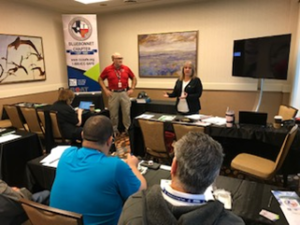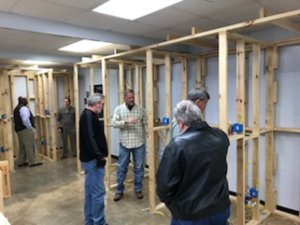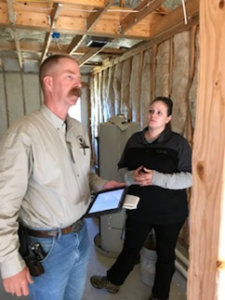
Technical training program growing in Texas

One of the privileges and opportunities I have been given is to speak about the International Code Council’s High School Technical Training Program (HSTTP) twice a year at the Texas Industrial Vocational Association conferences. I get to meet high school instructors that are either teaching, or planning on teaching, construction trades at their respective schools. I have put together a team of four speakers to help me present the technical training program to these instructors, who are from around the state of Texas. These instructors have expressed interest in us helping train them teach the codes in their respective schools, as well as getting certified at the B1 Inspector level.
As a part of these growing opportunities Code Council Government Relations Career Development Coordinator Jim Ellwood made a trip to Texas in January to meet with me and group of instructors from the Dallas, Houston and Central Texas area to discuss the technical training program. International Code Council Board Director Shirley Ellis and Government Relations Regional Manager Kelly Sadler joined the group as we later toured the Greater Waco Advanced Manufacturing Academy, of the Waco Independent School District, where Bobby Carpenter (yes, his last name really is Carpenter) is teaching the technical training program for the first time. Carpenter showed us the various rooms where he is setting up the different trades for the students to work. The students are also helping to build a home with NeighborWorks Waco, which has agreed to schedule nine months to build the house to enable students to work on an actual house as part of their training while in school.
ICC technical training pays off

Belton High School Instructor Michael Carrillo — formerly building construction trades instructor of the Texas State Technical College in Waco, Texas, and team leader for the SkillsUSA Competition — sent the following information from the National SkillsUSA Teamworks Competition in Louisville, Ky.
“We finished second in the nation at the collegiate level. Belton High School (Belton, Texas) ended up taking the gold medal at the high school level. Both teams were successful due to their knowledge in the building codes learned in the ICC technical training.”

Texas State Technical College (TSTC) and Belton High School were the first college and high school, respectively, in Texas to incorporate the Code Council’s technical training curriculum. As the coordinator for these programs, Jim Ellwood has worked tirelessly with Michael Carrillo and Belton instructor Craig Sullivan to incorporate these programs. It has been a distinct privilege for me to work with Jim, Michael and Craig to spread this great program and training for students around the state of Texas. Jim is working with schools around the country to continue to grow this type of program and many states are seeing similar successes. Great job guys and congratulations to all!

Jim Ellwood has told me on more than one occasion that as this program continues to explode across Texas I will need help in handling all the requests for information and school visits that will start coming. This is on top of my current job as inspection supervisor with the city of Waco. It is a great problem to have, but it brings home the old expression that I will be “busier than a one-armed paper hanger!”
In an interview promoting the HSTTP, one student explained that the code training helped him in seeing projects the way inspectors view it when they are on the job. If a student can learn what the codes “say” in different phases of a project, then when an inspector comes out, they can “speak the same language.”
A student’s code training allows them to understand why a particular inspection might get turned down — because it doesn’t meet code for some reason, how they can fix it and what inspectors look for — so that they can head off any issues before the inspection, making the job run smoother during the inspection process and keeping job on track for the owner.

Exposing a student to the codes can open up a whole other world of possible careers as an inspector, plans examiner or a building official. Experience in the construction field is critical in this area, and is a big reason the Code Council offers these beginning code classes at the high school level — to give these students a jump start on a possible career in construction, accompanied by the required code knowledge they will need. As far as the inspection side of things, it is important for a student to work in the field for one of the trades to gain the knowledge of how things work in construction.
When looking to hire inspectors, most cities require some experience in the construction field. This just helps someone make an easier transition into the inspection side of construction. However, if an applicant already has an ICC certification on their resume coming into an interview, that puts them miles ahead of someone who doesn’t have one. Cities will provide training opportunities for their employees to maintain their certifications and will encourage employees to look into additional certifications related to their line of work. Cross-training is encouraged in inspections just like in the construction field. Billionaire Warren Buffet once said, “The more you learn, the more you earn!” That can be applied to many fields, but is especially true in the construction and inspection professions.
One way to gain this experience is for students to do “ride-a-longs” with inspectors to see first-hand how this process works. The city of Waco Inspection Office has done several ride-a-longs with students from TSTC building construction trades classes.
Final thoughts
As important as technology is to our society, you still need that “human-element” to make a society work. Computers and technology cannot take the place of good, old-fashioned, face-to-face customer service. While some young people are “in it for the money,” which is fine and good to a point, I like to periodically tell students that if you are good at a skill, and you provide good customer service, you will have all the work you want. People pay for good work and good service. If someone is knowledgeable, has a good work ethic and treats the customer with respect, people know they are getting their money’s worth.







